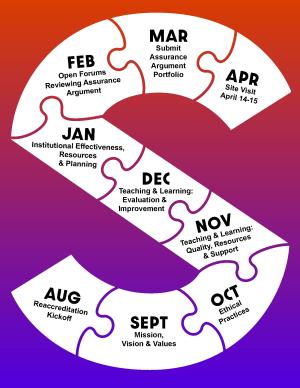
What is Accreditation?
"Accreditation is the recognition that an institution maintains standards requisite for its graduates to gain admission to other reputable institutions of higher learning or to achieve credentials for professional practice. The goal of accreditation is to ensure that education provided by institutions of higher education meets acceptable levels of quality." - U.S. Department of Education
There are both Institutional accreditations and Specialized or Programmatic Accreditations. Learn more.
Accreditation Status at NDSCS

NDSCS’s accreditation through the Higher Learning Commission (HLC) was originally granted in 1971 and reaffirmed in 1981, 1991 and 2001. NDSCS was then approved to follow the Academic Quality Improvement Program (AQIP) beginning in 2002 because of their good standing with HLC.
AQIP was a quality-based, continuous improvement model that focuses on developing a quality mindset, identifying issues early, and generating evidence that meets quality standards. Quality Standards were more regularly updated, and a Systems Portfolio was submitted to HLC in 2004, 2009, 2013, 2016 and 2018 with reaffirmation of our accreditation happening in 2009 and 2016 after comprehensive evaluations and site visits.
In 2019, HLC officially phased out AQIP as an accreditation pathway. NDSCS now follows the open pathway toward reaccreditation. The open pathway follows a 10-year cycle and is focused on quality assurance and institutional improvement. It also includes a Quality Initiative Project (QIP) that meets NDSCS’s needs and aspirations. The QIP at NDSCS is the Partnering for Success project.
In April 2025, NDSCS will undergo its next Comprehensive Accreditation Review and site visit. In this process, the HLC will once again review the college based on the HLC Criteria for Accreditation which addresses the mission, educational quality, and integrity of the institution, as well as compliance with federal regulations and academic progress.

Value of Accreditation
Accreditation:
- Encourages confidence that an institution’s education is fair and accurate.
- Assures that a neutral, external party has reviewed the quality of education.
- Confirms that institutions and programs have processes in place to meet changes in thinking.
- Provides for eligible students to have access to federal financial aid.
- Assists with transfer of credits among institutions.
- Aids with entrance to a profession.
- Signals prospective employers that an educational program has met widely accepted educational standards.

Throughout this year, be on the lookout for more updates and how you can contribute to the success of NDSCS and its continued accreditation. Get ready to piece it together!

September is Mission Month
Work is continuing in the NDSCS reaccreditation effort, a comprehensive review that occurs on a 10-year cycle.
The process will culminate in April 2025 with a site visit from a review team of the Higher Learning Commission.
This is an appropriate quote by Benjamin Franklin that can be applied to our accreditation efforts: “By failing to prepare, you are preparing to fall.” Rest assured that there are several people working to ensure that NDSCS will be prepared.
Over the next nine months, the college will continue to document how it meets or exceeds the commission’s criteria for accreditation. The criteria fall into five broad categories: mission; ethical conduct; educational quality; educational evaluation; and planning and resources.
During September, the accreditation team is focusing on sharing information about NDSCS’s new Mission, Vision, and Values, also known as the guiding principles.
Mission:
NDSCS: The Science of Learning By Doing
Vision:
NDSCS will be the leader in delivering comprehensive technical education in partnership with industry and community while fostering a dynamic learning environment to empower students' success in today's ever-changing world.
Values:
- Belonging:
- We believe in creating an inclusive and supportive college community. We strive to ensure that all community members feel safe, supported, welcome, and comfortable sharing their thoughts, ideas, and concerns.
- We recognize the importance of building relationships and understand that they are the foundation of a thriving community.
- We foster a continuous learning, respectful, and trusting culture where everyone’s unique perspectives and contributions are valued and embraced.
- Integrity:
- We are committed to upholding a powerful sense of ethical principles and moral values in all that we do.
- We believe in conducting ourselves with honesty, accountability, transparency, professionalism, and fairness.
- We strive to create a culture where compassion and kindness are not only valued but actively practiced.
- Grit:
- We commit to embodying resilience, passion, and positivity when faced with challenges, knowing they are opportunities for growth and development.
- We are dedicated to working hard and persevering in pursuing bold goals, pushing the boundaries of what is possible.
- We believe our innovation and resourcefulness drive us to continuously seek new ways to serve our students and adapt to the evolving needs of education.
The accreditation team is asking that each NDSCS employee become familiar with our guiding principles and reflect on what you are doing in your department, program, or classroom to support them. The college’s mission is central to accreditation and assurance of academic quality.
What we do at NDSCS also needs to support the mission and vision of the North Dakota University System which was revised on July 22, 2021.
- NDUS Mission: “To enhance economic growth, social vitality, and quality of life for North Dakota through the discovery, sharing, and application of knowledge.”
- NDUS Vision: “To lead the nation in educational attainment through access, innovation and excellence.”
NDSCS is in the process of finalizing a new strategic plan that includes specific goals and strategies for achieving our guiding principles while aligning with NDUS’s mission.
You can also find this information on the NDSCS website at: ndscs.edu/about-ndscs/our-mission
Criterion 2. Integrity: Ethical and Responsible Conduct
HLC Criterion 2 underscores the importance of integrity, ethics, and responsible conduct in all aspects of NDSCS’s operations and emphasizes NDSCS’s commitment to upholding these principles in its pursuit of excellence in education.
- NDSCS establishes and follows policies and processes to ensure fair and ethical behavior on the part of its governing board, administration, faculty and staff
- NDSCS presents itself clearly and completely to its students and to the public
- NDSCS’s governing board is autonomous and makes decisions in the institution's best interest to comply with board policies and ensure the integrity of NDSCS
- NDSCS is committed to academic freedom and freedom of expression in the pursuit of truth in teaching and learning
- NDSCS’s policies and procedures call for the responsible acquisition, discovery and application of knowledge by its faculty, staff and students
This criterion assesses NDSCS’s commitment to maintaining the highest standards of integrity, ethics, and responsible conduct in all its activities, including teaching, service, and administration.
- Ethical Governance and Leadership: NDSCS must demonstrate strong ethical leadership at all levels, with governance structures that promote integrity, transparency, and accountability. Leadership should uphold ethical standards in decision-making processes and foster a culture of integrity throughout the institution.
- Academic Integrity: NDSCS should promote academic honesty and integrity among students, faculty, and staff. This includes clear policies and procedures for addressing academic misconduct, promoting a culture of academic honesty, and providing resources for ethical decision-making.
- Financial Integrity: NDSCS should maintain sound financial management practices, including transparency in financial reporting, compliance with relevant regulations and standards, and responsible stewardship of financial resources to support the NDSCS's mission and goals.
- Ethical Behavior and Community Engagement: NDSCS should engage with our community in a manner consistent with ethical principles, fostering mutually beneficial partnerships and contributing positively to the social, economic, and cultural well-being.
- Continuous Improvement: NDSCS should continuously assess and improve its policies, procedures, and practices related to ethical conduct, incorporating stakeholder feedback and best practices.
HLC is concerned with NDSCS’s adherence to ethical principles, transparency, and accountability in decision-making processes and interactions with all stakeholders, including students, faculty, staff and community. Examples below:
|
|
Criterion 4. Teaching and Learning: Evaluation and Improvement
HLC Criterion 4 emphasizes the importance of assessing and improving educational quality to ensure student success. Here’s an overview of what NDSCS employees should know about this criterion:
Overview of HLC Criterion 4
Criterion 4 evaluates how effectively an institution:
- Maintains a commitment to educational quality.
- Uses data to assess and improve teaching and learning.
- Ensures the currency and relevance of its educational offerings.
Key Components of Criterion 4
- Assessment of Student Learning (Core Component 4.A):
- Clear Learning Goals: Programs must have defined student learning outcomes.
- Assessment Processes: Institutions should collect, analyze, and use data to improve student learning.
- Integration Across the Institution: Assessment should happen at course, program, and institutional levels.
- What employees need to know:
- Understand your department’s learning outcomes.
- Participate in assessment efforts (e.g., data collection, reporting results).
- Collaborate to use assessment findings to improve instruction.
- Assessment of Student Persistence and Completion (Core Component 4.B):
- Institutions must track and support student retention and graduation.
- Use data to identify barriers to persistence and implement strategies to overcome them.
- What employees need to know:
- Be familiar with student success metrics (e.g., retention rates, course completion rates).
- Contribute to efforts that support student progression (e.g., advising, tutoring).
- Continuous Improvement (Core Component 4.C):
- The institution must regularly review its academic programs and support services.
- Decisions should be data-informed and tied to the institution’s mission.
- What employees need to know:
- Stay informed about program review processes and findings.
- Provide input or feedback during the review process.
- Support institutional efforts to align improvements with strategic goals.
- Quality of Educational Offerings (Core Component 4.D):
- Ensure programs remain current and relevant.
- Support faculty professional development.
- Keep curriculum aligned with employer and community needs.
- What employees need to know:
- Understand how their role impacts curriculum quality.
- Engage in professional development opportunities.
- Be prepared to adapt to changing academic and workforce needs.
Why Accreditation Matters to All Employees
- Accountability: HLC accreditation impacts funding, transferability of credits, and the institution’s reputation.
- Student Success: Employees across roles contribute to creating an environment that supports learning and achievement.
- Continuous Improvement: Accreditation encourages reflection and innovation, benefiting students and the institution.
By understanding your role in Criterion 4, you can actively contribute to a culture of quality and student success at NDSCS.
January and February were busy months of writing and editing the assurance argument and completing the federal compliance document. After all that work, I am excited to let you know that the required documents were submitted to the Higher Learning Commission on Friday, March 7, which was 10 days ahead of schedule. It was a big relief to have it completed before spring break.
I am attaching the link for the finalized documents so you can review what was submitted. The PDF document consists of an introduction, the assurance argument, and the federal compliance.
NDSCS Assurance Argument and Federal Compliance - March 2025
This is a large document. Using the bookmarks will help you navigate the document more easily. You will also be able to find this document on the Intranet under Accreditation and Strategic Planning and on the NDSCS Website under Accreditation.
The chair of our HLC Review Team, Dr. Jon Bauer, informed us that the team received our documents and are beginning to read and review the assurance argument. In addition, the team randomly selected 30 courses taught at NDSCS and asked for those syllabi to be uploaded into the HLC system. They will be reviewed as a part of federal compliance. We will wait for additional correspondence and respond to any additional requests from our HLC team.
Once again, THANK YOU to everyone who helped in any way! Working together the reaccreditation puzzle is closer to being completed.